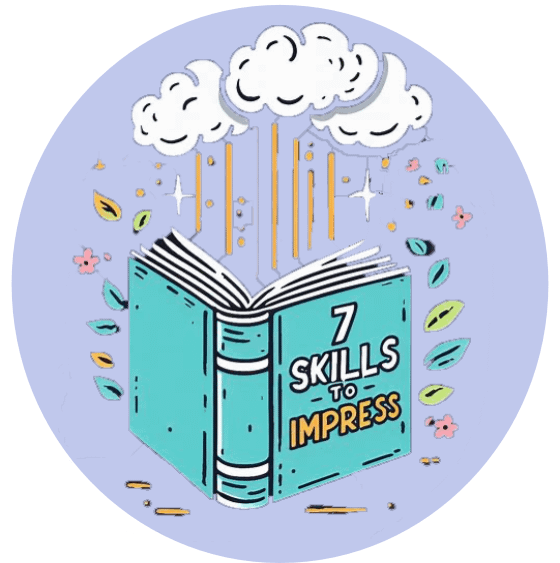
Hi, My name is Mark Sapsford, the author of The 7 Skills to impress™. I’m glad you’re here because I want to explain the unusual origins of the 7 Skills. And I think it would help if I gave you some insight into the adversity in which they were forged and proven.
I guess the first thing you need to know is that I unknowingly lived most of my life with PTSD. If it wasn’t for this, The 7 Skills would never have been born.
Living in Fear
My stepfather came into my life when I was three and a half years old. He beat me regularly, often leaving me dazed and concussed. I lived in near-constant fear, and his treatment of me made me feel useless and worthless. I never felt safe, wanted or respected around him.

I didn’t get a diagnosis until many decades later. I thought something was wrong with me. In the meantime, I knew I wasn’t very good at dealing with pressure. Somehow, when I needed them most, my skills and talents would desert me. I was invisibly shackled.
But I knew I should be able to perform. I am a good problem solver; I’ve always been fit, capable, bright, and brave. All my life, I was determined to prove my self-image wrong.
I worked hard and pushed myself out of my comfort zone. Sometimes I soared to success, but other times, I crashed and burned. The wins never felt that good, and the failures were almost unbearable and stayed with me.
Pushing Myself Out of The Comfort Zone

A hatred of bullying led me to join the police service. My career quickly took off, and outwardly, all looked good. As a child, I learned not to show my emotions because when I did, I was often beaten. So, as a police officer, I could mask my fear and bluff my way through tough situations.
This skill was invaluable because, as often as possible, I pushed myself to do anything that stressed me. And I would continue to do this until I felt I could handle the challenge. This included everything from public speaking to major incidents, firearms duties and outbreaks of public disorder.
Although I wasn’t on any fast-track promotion plan, I reached senior ranks relatively quickly. I had trained in firearms on the way up – not so usual in the UK police, an unarmed service – and was frequently called upon as a Firearms Commander for hostage and siege events.
At one such firearms job, I decided I needed to fix what was happening in my head. I had a good reputation with the firearms team but knew I was bluffing. Often, when the pressure came down, I couldn’t think. I could even struggle to speak.
An End To The Bluffing
I got by because I worked with great people, and I’m a good listener. I would always ask for feedback. From this, I could gather my wits and make decisions. It turned out to be an effective approach; my people felt valued, and I had a good success rate.
But I wanted to be able to think and plan for myself in the most challenging moments.

I had to fix this problem!
However, the police service at that time wasn’t a place where you could put your hand up and admit to something like this. My reputation would have been shredded, and I’d have been removed from the front line and given a desk job.
So I studied the problem privately. For years!
I made early inroads by learning about the Fight, Flight or Freeze (FFF) response and how to overcome it. This addressed the symptoms of my problem, and that simple piece of knowledge was a life changer.
And then I became curious as to what was behind this. Why I would get FFF in adversity, whilst others didn’t seem to.
Answering that question took my studies deep into the subconscious mind. I went on every course I could that might help. I read books and academic papers and attended lectures and demonstrations.
Breakthrough!
Then I took all I learned out into the testing ground of my working life, into the coal face of some very high-pressure incidents. I discovered which theories couldn’t survive outside of the classroom and those which made a difference in the big bad world.
Learning and testing this theory in my work led to a breakthrough in my understanding. I began to see how and why pressure affects people differently. More than that, I learned that our language is full of cues that give away our innermost thoughts about the world around us.
After a short conversation with anyone, I could understand the workings of their subconscious mind and how they would respond to pressure.
I cover this in Part 1 of The 7 Skills to impress™ book.
And with that understanding, I worked out what I could do to shed my shackles to thrive and inspire in adversity. The process I developed and tested so thoroughly became The 7 Skills to impress™.
The 7 Skills are explained in Part 2 of the book.
Introducing Eddard

The forging of the 7 Skills was helped greatly by my work with Police Negotiators. Eddard, who features prominently in the book, took to my work like a duck to water.
After one job that hadn’t gone as well as we’d hoped, we started discussing what I’d discovered about the subconscious mind. I was developing ideas on how this learning could help persuade resistant people to do the right thing.
Eddard was captivated and enthusiastically trialled and tested the language formulas I was developing. We had to turn complex theories into simple, workable ideas. Complexity is your enemy in times of pressure. The language skills had to be simple.
Eddard used all The 7 Skills in his negotiations,
And he reached solutions more quickly and with less argument and resistance. And by solutions, I mean that people stepped off a ledge to safety, took a knife away from the throat of a hostage, or put down a firearm and surrendered themselves to custody. This stuff mattered, the jobs were challenging, and success was hard to come by.
And we proved that The 7 Skills to impress™ worked in the harshest and most terrifying moments.
Giving My Performance Wings
By this time, I routinely used The 7 Skills to impress™ and had smashed through my performance glass ceiling. I could stay composed, think, plan and lead in the most challenging times. I was still a good listener, but now it was because I chose to be rather than having to be. I had thrown off the invisible shackles and given my abilities wings.

So I began to be more open about the journey I’d been on and the problems I had solved for myself. To my surprise, many colleagues discreetly approached me asking for help. I soon found out that my experience was more common than anyone knew.
And that’s how my coaching career got started.
And it was so rewarding. I couldn’t believe the transformations I was able to help people make with The 7 Skills.
Eventually, after I left the police service, The 7 Skills to impress™ took me into elite sports. I worked with many famous coaches, athletes and teams, helping them to perform consistently. We got them to reach their full potential and often to find another level.
I worked with professional coaches and business leaders on composure under pressure and inspiring language skills. My favourite jobs, perhaps because of my childhood, involved working with parents, carers and teachers, helping them to inspire their children to thrive in an ever more challenging world.
After many years of working with The 7 Skills to impress™, I can confidently say that they have been forged and thoroughly tested in the most challenging circumstances. And they have proven simple enough to work in complex situations and robust enough to generate transformations in self-belief and performance.
“I think you need to see a psychiatrist!”
I retired from coaching and moved to Spain. There I decided to write my book on The 7 Skills to impress™. During that time, my partner uttered the words no one wants to hear, “I think you need to see a psychiatrist!”
She had begun to see all the symptoms I managed to mask from everyone else. The psychiatrist listened for only a few short minutes and then confidently pronounced that my childhood had left me with PTSD.
In a way, this was a relief. I no longer saw myself as a flawed person. I could work with that diagnosis and overcome it. And with the 7 Skills I have.
But I also began to look back on my life with pride. For the first time, I saw the true power of The 7 Skills to impress™. With them, I’d raised myself to elite performance levels despite living with PTSD.
And now it’s all here in my book and website.

I thought it would take me six months to write the book and maybe a couple of months to set up the website. Well, it’s taken five years!
This quite literally is my life’s work.
Take away fatherhood and some of the most rewarding successes in my career, like saving Jacqui (see Prelude in the book Part 1), The 7 Skills to impress™, is my biggest achievement.
And I give so much away here for so little because I want this simple, practical and life-changing system to help as many people as possible.
I’ve written this for you. Please use it to help yourself, and those you love to thrive in this ever more challenging world.
With all my Best Wishes,
Mark

Three Seconds To Save A Life – Jacqui’s Story
In the next chapter, we hear the remarkable story of how Police Negotiator Eddard saved a mother and her children from tragedy using these simple but powerful tools.
Eddard’s thrilling success proves the 7 Skills go far beyond standard methods – they tap into the deepest levels of human potential.
Jacqui’s story will open your eyes and show you how to access talents you never knew you had. These simple skills give you the keys to thrive under pressure, persuade others, and inspire yourself and those around you.
Click Below:
Three Seconds To Save A Life With The 7 Skills to impress™ –
Jacqui’s Story
